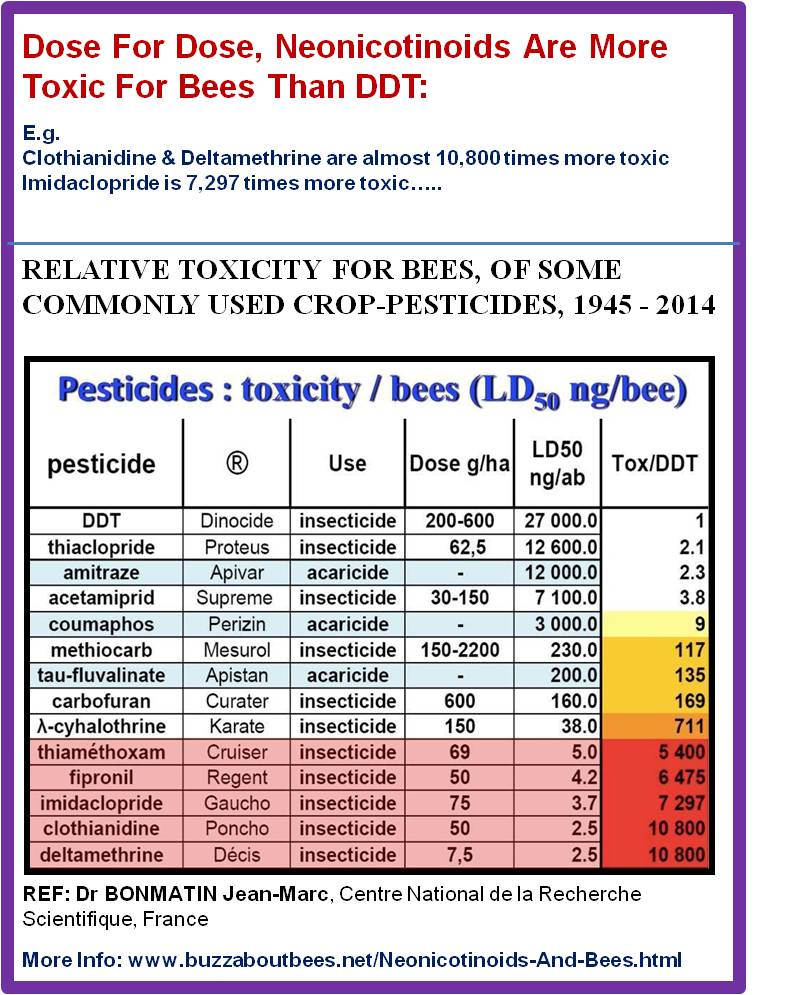Henk Tennekes:
"A Disaster in the Making"
In September 2010, toxicologist, Dr Henk Tennekes had a scientific paper published in the journal, Toxicology. He followed this up with a book: "A Disaster in the Making".
A description of the book states:
"The pesticide industry
is creating a 'Poisonous Landscape' in which the only thing that will be
allowed to live, will be the insecticide-laced crop which brings in the
profits.
It is a serious ecological report rather than a book for
general readers, but all ecologists, beekeepers and bird
conservationists should read this description of the coming Ecological
Apocalypse."
I thought I would add in my own, additional view....
In “Silent Spring”, Rachel Carson gave society a warning about man’s addiction to agro-chemicals:
“These sprays, dusts, and aerosols are now applied almost universally to farms, gardens, forests, and homes - non-selective chemicals that have the power to kill every insect, the "good" and the "bad", to still the song of birds and the leaping of fish in the streams, to coat the leaves with a deadly film, and to linger on in soil - all this, though the intended target may be only a few weeds or insects.
Can anyone believe it is possible to lay down such a barrage of poisons on the surface of the earth without making it unfit for all life?.”
Unfortunately,
man still has not learned the lessons – it seems the paragraph above,
written and published in 1962, serves as an apt description of our
ignorant and/or arrogant disregard of nature and environment today, and
judging from the research, the chemicals we are using are worryingly
deadly.
Among his arsenal, man can apply systemic pesticides on
farmlands and golf courses. They can be used by councils in public land
spaces, or by trusting homeowners in their gardens; or they can be
purchased in vine-weevil killing composts and some garden fence
treatments.
Dr Tennekes’ book suggests systemic pesticides are
having a devastating effect on our environment. This may confirm the
fears of many informed individuals, independent scientists and
conservation organisations.
What is so worrying about systemic pesticides? Tennekes has said:
- "Pesticides
may cause problems when they seep out of storage or are washed out of
the soil into waterways and groundwater. The chemicals are then diffused
through the environment and may affect marine and bird life. Systemic
insecticides are prone to cause such problems because not only are they
soluble in water and mobile in soil, they are also not easily degraded
in soil and water , i.e. they persist in soil and water, and aquatic and
terrestrial organisms may be chronically exposed to these substances."
(See this
Q&A with Henk Tennekes
- opens a new window).
Tennekes’ book is an urgent reminder of
Rachel Carson’s message. Drawing on his scientific research (as a
published toxicologist), he illustrates the ecological collapse that has
already begun to happen.
This book shows that killing insects
does not only mean killing “nasty crop-eating pests”. It means removing
a food source from the web of life, depriving (and ultimately starving
to death) the birds, bats and other creatures that directly or
indirectly depend upon them.
Meanwhile, it seems the regulatory
system is failing in its foremost duty to protect man and the
environment (for ultimately, to protect the environment IS to protect man!).
As
I write, scandals of vested interest, regulatory incompetence and
neglect continue – whilst the use of systemic pesticides goes on, amidst
a backdrop of fudge, smoke screens, and confusion.
But the
independent evidence against systemic pesticides is compelling – and in
some cases, it draws attention to glaring holes in the research
presented by the pesticide manufacturers.
Perhaps we need to
ask ourselves: in what should we place our trust: the pesticides
industry, its government lobbyists and their politician supporters?
Or
shall we look upon the untouched, yet perfectly balanced eco-systems of
the rainforests – or even the western wildlife garden (perhaps complete
with a fruit tree or two, and even a productive veg patch), as evidence
that nature can balance itself, and accept that man causes the imbalance of
an eco-system that is actually capable of feeding all the creatures on
the planet if we treat it with the care and respect it deserves.
Everything is connected in this great web of life on earth. Whether
it hops, crawls, flies, slithers, creeps, wriggles, swims, jumps,
flutters, flows, grows from the earth or water bed, ultimately man needs
nature – and together, we are sustained not only by the air we breathe
but by the land and water of this beautiful earth. This book by Dr Henk
Tennekes is an urgent call for us to protect it.
